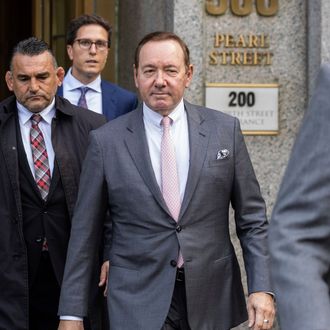
Kevin Spacey was cleared in his New York sexual-misconduct civil trial on October 20. After about one hour and 15 minutes of deliberations, jurors returned a verdict finding that Anthony Rapp did not prove, by a “preponderance of evidence,” that Spacey “touched a sexual or intimate part or parts of Mr. Rapp.” When the verdict was read, a clap rang out in the courtroom. Spacey said nothing as he left the courthouse. He walked wordlessly through a throng of photographers into a waiting black SUV. “We’re very grateful that this American jury saw through these false allegations. Mr. Spacey is deeply grateful,” said his lead attorney, Jennifer Keller. Spacey still faces a criminal case in London. “What’s next is Mr. Spacey is going to be proving that he’s innocent of anything he’s been accused of.” The verdict came down shortly after lawyers presented their closing arguments and the judge’s instructions; their presentations could be described as largely plodding and sometimes peppered with the discomfiting sexual discourse that has characterized these proceedings. At times, one genuinely wondered about the ideas behind certain rhetorical constructions that littered the closing arguments.
Richard Steigman, Rapp’s attorney, tried to combat defense claims that he was lying about Spacey making an aggressive, unwanted sexual advance in 1986, when the Rent actor was 14 and the House of Cards star was 26. Among Steigman’s arguments: “Do you think you could make up a better story than that if that was your goal?” Steigman said. “If you were crazy enough to spend 35 years trying to destroy this poor, innocent guy who never did anything to you … if that fueled a 35-year insane, jealous rage, you think maybe you’d say, ‘He said some sexual things to me,’” Steigman said. “You think maybe you’d want to add on a little bit that ‘He touched me with his hands in certain ways’ or a little worse.” Steigman also said the defense was using a “homosexual rage” argument, attributing Rapp’s allegations to his anger that Spacey hadn’t come out.
Steigman also addressed the defense’s focus on John Barrowman, whose testimony was given in a video deposition and seemingly tried to hit on societal squeamishness over May–December romances between adults, lumping Barrowman into Rapp’s age group despite the fact that Barrowman wasn’t a minor. Barrowman, then 19, was visiting Rapp, his friend from high school, in spring 1986 when they went backstage at Long Day’s Journey Into Night. They encountered Spacey and went to dinner and the Limelight nightclub with him. Barrowman and Spacey testified that the trio returned to Spacey’s Upper East Side apartment. “Look at my view, come pet my dog,” Steigman said of Spacey inviting them to his apartment. “This is what this adult is doing with these two teenagers.” Rapp went to the bathroom. The men’s flirting intensified but stopped abruptly, with Barrowman testifying that he didn’t want his younger friend to see them. “He wants to tell you, ‘Well, Barrowman is a man at 19. What’s wrong with that?’” Steigman said. “And you think it’s okay to make the moves on [Barrowman], you think it’s okay to bring this 14-year-old kid with you? In what world is this an appropriate thing to do?” Steigman added, “What did he think was going to happen when Anthony came out of the bathroom when this pass was successful? Did he think Anthony was going to sit on the bed and watch TV? You know what he was thinking. You know what was going on there.”
When Keller, Spacey’s lead attorney, started her closing argument, she thanked Steigman for describing her as “one of the greatest lawyers in the country.” Then came her chaser, a passive-aggressive dig at his area of practice. “Mr. Steigman himself is one of the top personal-injury lawyers in New York, which means in the country, and has won a lot of his money for his clients,” Keller said. “I’m a little behind in that derby.” Keller claimed that Seiger mischaracterized her opening statement, saying she “never talked about homosexual rage” nor said Rapp was enamored with Barrowman. As for Rapp’s allegations, she said, “This didn’t happen. It just didn’t happen. We’re here because Mr. Rapp has falsely alleged abuse that never occurred at a party that was never held in a room that did not exist.” Rapp, Keller said, had long harbored animosity toward Spacey “for not coming out.”
There was also the matter of Me Too. Keller praised the movement’s importance but described it through the lens of male-female violence. “The Me Too movement was necessary in a deeply misogynistic society” where “women were not believed no matter what,” Keller said. “The pendulum needed to swing away from that, and it did, thankfully, but it’s also not for you to decide whether it’s gone too far in the other direction. The one thing that I would say is this whole ‘Believe the accuser — you always have to believe the accuser’ has no place here either.” Closings concluded after about two and a half hours.
This story has been updated with additional reporting.


